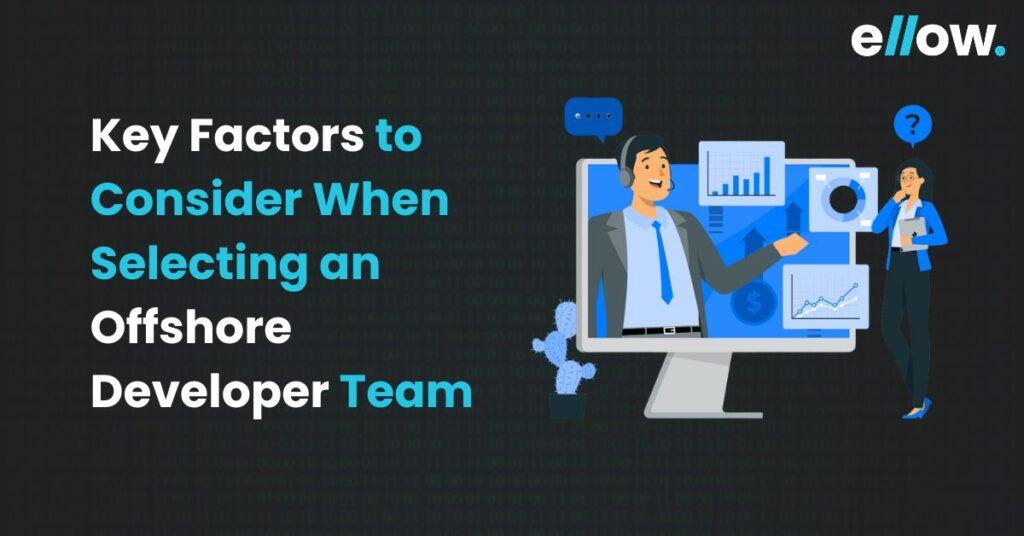
Let’s build the future together.
Great ideas need great people. Partner with us to bring your vision to life, or take the first step in your career by joining our team of innovators.

In today’s world, businesses are working with teams from other countries more than ever. One big reason is that offshore teams can be skilled, affordable, and flexible. But finding the right team from another country can be challenging. To help, we’ve gathered advice from experts and some important data.
In the quest to understand the key factors in selecting an offshore developer team, we sought insights from six industry leaders, including CEOs and general managers. From prioritizing English language proficiency to considering the type of work, these experts share their top considerations for making this critical decision.
Martin Potocki, CEO of Jobera, emphasizes the importance of English proficiency, especially in projects involving intricate documentation.
“When choosing an offshore developer team for my project, their proficiency in the English language was a crucial factor for me. Given the complexity of the project documentation and the need for regular online meetings, it was imperative that we communicated clearly.
Ensuring that the external team possessed strong English skills facilitated smoother communication, enabling us to better grasp each other’s needs and expectations. Assessing this competency is essential, as clear communication can often be the determining factor between a successful offshore collaboration and one fraught with challenges.”
Martin Potocki, CEO, Jobera
A team proficient in English ensures seamless communication and mutual understanding.
In fact, a study by the PMI (Project Management Institute) highlighted that poor communication was the primary factor in 29% of project failures.
Example: Let’s take the development of a complex AI algorithm. If miscommunication occurs, it could derail weeks of intricate coding and algorithm training.
Sign up with ellow, access 25,000+ pre-vetted developer profiles, and start building your development team in 48 hours.
Jay Toy of 88stacks believes in the harmony of technical skills and cultural alignment. The team you choose should not only excel technically but should also resonate with your company’s ethos.
A Forrester Research survey underscored this by revealing that 70% of companies prioritize cultural fit over mere technical skills.
“Beyond mere coding expertise, it’s crucial that the team truly understands the subtleties of your startup’s vision and values. Find a team that is not only technically proficient but also excels in communication and can effortlessly integrate into a growth-driven, multifaceted environment. Opt for those with a proven history of successful collaboration across varied functions, reflecting the diverse roles often encountered in startups.”
Jay Toy, General Manager, 88stacks
Example: A fintech startup focusing on the Asian market would benefit from a team familiar with Asia’s unique financial dynamics, rather than just a technically sound team.
Jacob Maslow from Rest Equation drives home the point about the importance of cultural and communication compatibility. It’s not only about shared language but also synchronized rhythms of work.
A Globig survey pointed out a telling fact: 40% of companies cited time zone differences as their top challenge when managing offshore teams.
“When collaborating with offshore teams, it’s important to account for aspects such as time zones, language proficiency, work ethics, and cultural nuances. Effective collaboration is achieved when both parties align in their communication, which in turn reduces misunderstandings, guarantees a clear conveyance of requirements, and promotes a constructive working relationship.
Beyond just assessing the offshore team’s coding prowess, it’s imperative to gauge their comprehension, responsiveness, and ability to adapt to the unique needs and challenges of your project.”
Jacob Maslow, Owner, Rest Equation
Example: An American firm partnering with a Japanese team needs to factor in not just linguistic differences, but also contrasting working hours and national holidays.
Matthew Ramirez underscores the idea that the nature of your project often dictates your choice of the offshore team. Deloitte’s Global Outsourcing Survey provides a perspective on this, revealing that strategic, innovative projects are less likely to be outsourced than operational ones.
“When choosing an offshore developer team, it’s essential to clearly identify the nature of the work they will undertake. This understanding aids in determining if they are the right fit for the task. For instance, if the project requires a team that can operate autonomously, it’s crucial to ensure that the selected developer team is adept at such independent work.”
Matthew Ramirez, Co-Founder, USMLE Test Prep
Example: A groundbreaking AR project, which demands constant innovation, might require a team that thrives in ambiguity and innovation rather than one that’s best at following detailed instructions.
As you evaluate your options, remember that the spectrum of factors influencing the selection of an offshore developer team goes beyond the above.
Ensure offshore teams meet global data protection standards.
Example: For European engagements, offshore teams must be GDPR compliant to avoid legal issues.
Assess an offshore team’s past work and client feedback to gauge their expertise and reliability.
Example: Teams with e-commerce expertise might display successful online store projects.
Understand the pricing structure—be it fixed, time & material, or dedicated team—to prevent hidden costs.
Example: Dedicated team models often suit long-term, evolving projects.
The offshore team should adapt to project changes, scaling resources as needed.
Example: Teams should ramp up resources if a startup’s user base unexpectedly surges.
Transparency is crucial; consistent updates help track progress and preempt challenges.
Example: Bi-weekly sprint reports maintain alignment among stakeholders.
With the tech industry’s rapid evolution, offshore teams should commit to ongoing training.
Example: As AI and blockchain rise, teams should be updating their skill sets accordingly.
The global talent pool presents vast opportunities, with Ellow’s expansive roster of over 25,000 vetted developers offering a diverse range of skills and expertise tailored to your project’s needs. However, to harness this potential effectively requires meticulous planning and informed choices.
Leveraging insights from industry veterans, backed by pertinent statistics, alongside consulting with expert software development teams, can guide your decisions and foster a successful offshore partnership.
In the landscape of global collaboration, being well-informed and tapping into such rich resources as Ellow’s talent pool is pivotal for driving innovation within your organization.
Sign up with ellow, and access 25,000+ pre-vetted developer profiles, and start building your development team in 48 hours.
Great ideas need great people. Partner with us to bring your vision to life, or take the first step in your career by joining our team of innovators.
Looking to build your career in development? team@ellow.io